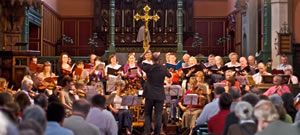Sunday's Sacred Cantatas are final step in a long musical journey that began in October 1997
|
It’s the end of an era for the West London Bach Consort and Players – their concert of Bach’s cantatas at 7:30pm on Sunday 12th December at St Michael and All Angels Church, Bath Road Chiswick represents the final step in a long musical journey that began back in October 1997.
The mission – to perform all of Bach’s surviving sacred cantatas – has meant several concerts each year, huge amounts of work from an unpaid army of volunteers, enormous amounts of score study and planning, and hundreds upon hundreds of hours of practise.
“Johann Sebastian Bach has always been a favourite composer of mine,” says the group’s music director Sandy Burnett, “but I have even more respect for him than I did 13 years ago. The experience of absorbing myself in his music for month after month has really brought home to me what an outstanding musician he was.
"The quality of his musical inspiration is consistently high – something that’s not always true about the other great classical composers. For some of the concerts I’ve had to step into Bach’s shoes and complete some of the cantatas for which some of the music has gone missing, and that’s been a tough experience which has left me with renewed respect for his craft as a composer! But for me the single most important thing to be aware of is not the excellence of the music, but what it says spiritually.
"Bach generally wrote this music to go hand in hand with the Sunday sermon – when the cantata ended, the sermon would begin. The cantatas often took an aspect of the Gospel of the Day as their starting point. And what I believe Bach set out to do was to use music to take the message further than mere words could, and allow the congregation to experience the spiritual message on a different level. His settings are full of striking musical metaphors – low repeated semiquavers to represent earthquakes, pairs of slurred semiquavers to represent yearning and so on. Remarkable though these effects are, and stunning though the music is, they are there for one reason only: to highlight the Christian message.”
The two final remaining cantatas in the West London Bach cycle are Jesu, der du meine Seele BWV 78 and Nun komm, der Heiden Heiland BWV 62. In the opening movement of BWV 78, Bach places each phrases of the chorale in a solemn instrumental context of a passacaglia, with strong shades of Henry Purcell to British ears. And he follows it with something quite different : one of his most tuneful duets, for soprano and alto on top of a pizzicato bass line. BWV 62 is the second of two cantatas Bach wrote on Martin Luther’s hymn Nun komm, der Heiden Heiland. The “saviour of the heathen” mentioned in the title comes to life most vividly in the tenor aria. Bach sets the words “höchste Beherrscher” to virtuosic runs of notes which are appropriately high and heroic – a good example of music and text going hand in hand.
Antonia Cviic (soprano), Clare McCaldin (alto), Tom Cragg (tenor) and Paul Sheehan (bass) are this month’s soloists; and the West London Bach Consort and Players (leader Miranda Wilson) are conducted by Sandy Burnett. A retiring collection will raise money for the Upper Room. After the concert, there will be an end of cycle party to which all audience members and all performers past and present are warmly invited.
December 7, 2010
